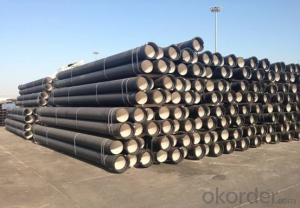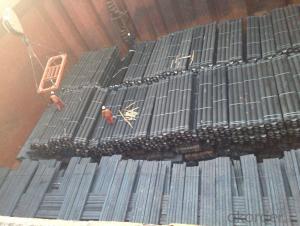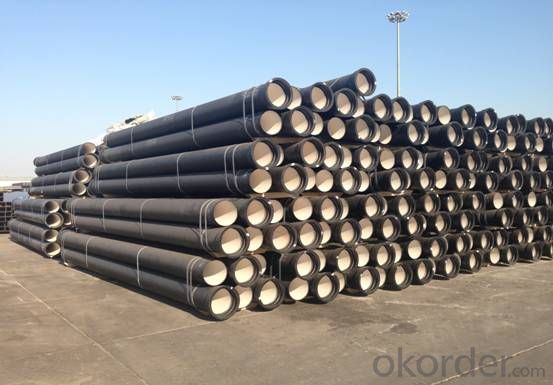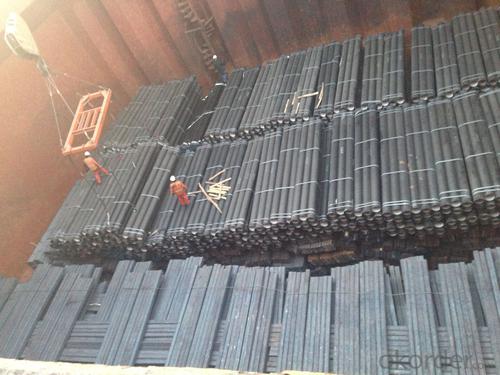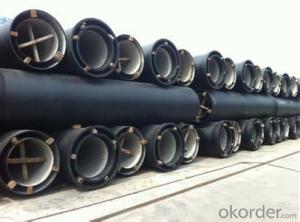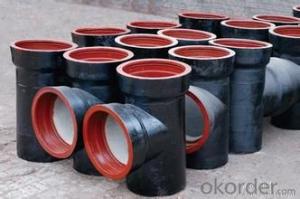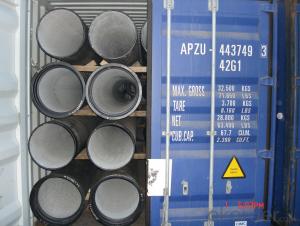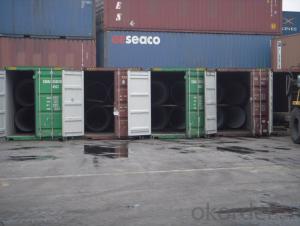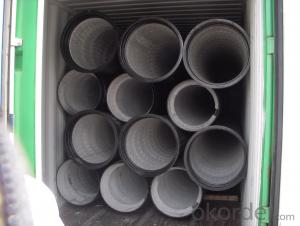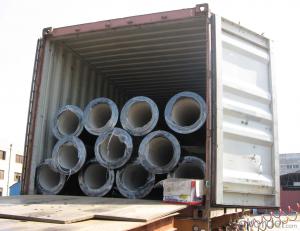DUCTILE IRON PIPES C Class DN300
- Loading Port:
- China Main Port
- Payment Terms:
- TT OR LC
- Min Order Qty:
- -
- Supply Capability:
- -
OKorder Service Pledge
OKorder Financial Service
You Might Also Like
Ductile Iron Cast Pipe is without any defects compare with tradition casting tech, which has many advantages particularly as follow:
(1) High density. In the "vertical upward casting" process, the melt iron of centre liquid column in center crystallizer is continuously feeding for volume shrinkage caused by condensation tube at outer circumference , which lead to be free of shrinkage porosity.
(2) High purity. When melt iron pouring, the mixed impurities such as gas, dross, sand grain which are lighter than melt iron could be eliminated at furnace mouth, its impossible to enter into the crystallizer through the channel, so the melt iron into the crystallizer is very pure.
(3) Strength with toughness. The cooling speed provided by continuous crystallizer is 30 times than sand casting and 5 times than centrifugal casting, and doesn't produce white iron, the eutectic cell volume of continuous cast iron is one eighth to one tenth compare with traditional cast iron. The density of graphite nodule in ductile iron can reach 300-700 pcs/mm2. Therefore, all reason above improve the strength and toughness of continuous cast iron.
(4) Free machining. The high speed cooling make the hardening phase (such as boride, steadite) not appear like reticular, massive or thick, but diffuse like fish bone and pane in shape, moreover, there are tiny graphite flakes inlaid hardening phase. It's free machining in BrinellHardness the range of 250-300HB. However, the Brinell Hardness of 250 is top limit to common metal materials.
(5) Uniform composition of tube wall. The convection mixing of liquid column caused by marching type drawing in crystallizer make the composition of tube wall well-distributed, and concentration gradient very little.
(6) High productivity. To the wall thickness of tube under 10mm, the speed of continuous casting is 1 meter/min, to the wall thickness of tube under 20mm, the speed of continuous casting is 0.5 meter/min, which is high efficiency that centrifugal or other casting tech couldn't reach.
- Q: How are ductile iron pipes protected against freeze-thaw cycles?
- Several measures are taken to protect ductile iron pipes from freeze-thaw cycles. Firstly, the material used in these pipes is naturally resistant to low temperatures, allowing them to withstand freezing conditions without becoming brittle or prone to cracking. Furthermore, a protective layer such as cement mortar lining or polyethylene encasement is often applied to the pipes. This extra barrier helps insulate the pipe and prevents direct contact between the iron and the surrounding environment, reducing the risk of freeze-thaw damage. Moreover, ductile iron pipes are designed with joints that allow for movement and flexibility. This design feature helps accommodate any expansion or contraction that may occur during freeze-thaw cycles, minimizing the risk of pipe breakage or damage caused by freezing water pressure. Proper installation practices, including sufficient bedding and backfilling, are also crucial in protecting ductile iron pipes from freeze-thaw cycles. Adequate support and suitable materials surrounding the pipes help minimize the impact of freezing temperatures on the structural integrity of the pipes. Regular inspection and maintenance of ductile iron pipes are essential for identifying any potential issues resulting from freeze-thaw cycles. Periodic assessments can detect signs of damage or deterioration, allowing for timely repairs or replacement to prevent further damage. In conclusion, ductile iron pipes are safeguarded against freeze-thaw cycles through the material's inherent resistance, protective coatings, flexible joints, proper installation practices, and regular maintenance. These measures collectively ensure the durability and longevity of ductile iron pipes, even in cold weather conditions.
- Q: How do ductile iron pipes perform in seismic zones?
- Ductile iron pipes perform well in seismic zones due to their inherent strength and flexibility. They are capable of withstanding ground movements and vibrations during seismic events without fracturing or breaking. The ductility of the material allows the pipes to absorb and distribute the seismic energy, reducing the risk of damage or failure. Additionally, their joint design and installation techniques ensure stability and integrity, further enhancing their performance in seismic zones.
- Q: Can ductile iron pipes be used for trenchless installation methods?
- Yes, ductile iron pipes can be used for trenchless installation methods. Trenchless installation methods are techniques used to install underground pipes without the need for extensive digging or trenching. Ductile iron pipes are a strong and durable choice for these methods due to their high tensile strength and flexibility. They can be installed using various trenchless techniques such as horizontal directional drilling (HDD), pipe bursting, and slip lining. These methods allow for efficient and cost-effective installation of ductile iron pipes without disrupting the surrounding environment. Additionally, the corrosion resistance of ductile iron pipes makes them suitable for trenchless installations in various soil conditions and environments.
- Q: How do ductile iron pipes handle thermal cycling in industrial applications?
- Ductile iron pipes are renowned for their exceptional ability to withstand thermal cycling in industrial applications. Thermal cycling refers to the fluctuation in temperature that occurs during the operation of various industrial processes. These pipes are designed to endure the stresses caused by thermal expansion and contraction, thus making them highly suitable for environments with significant temperature variations. One of the noteworthy features of ductile iron pipes is their remarkable thermal conductivity. This means that they efficiently dissipate heat from the hot areas, thereby minimizing the impact of thermal cycling. Furthermore, ductile iron pipes have a low coefficient of thermal expansion, which means that they expand and contract at a slower rate compared to other materials. This characteristic helps to reduce the stresses imposed on the pipes during thermal cycling. Moreover, ductile iron pipes exhibit excellent mechanical properties, including high tensile strength and impact resistance. These properties enable the pipes to withstand the mechanical stresses that may arise due to thermal cycling. They can resist the development of cracks or fractures, ensuring the integrity and durability of the pipes in industrial applications. Additionally, ductile iron pipes possess a high resistance to corrosion and oxidation. This is particularly crucial in industrial settings where the pipes may be exposed to aggressive chemicals or harsh environments. The corrosion resistance of ductile iron pipes ensures that they can endure the corrosive effects of process fluids and gases, even during thermal cycling. In conclusion, ductile iron pipes are well-equipped to handle thermal cycling in industrial applications. Their high thermal conductivity, low coefficient of thermal expansion, excellent mechanical properties, and resistance to corrosion make them a reliable choice for environments with significant temperature variations. These pipes effectively withstand the stresses caused by thermal cycling, guaranteeing their durability and longevity in industrial settings.
- Q: Are ductile iron pipes suitable for railway crossings?
- Railway crossings can indeed utilize ductile iron pipes. Ductile iron, a robust and long-lasting material, finds extensive use in numerous applications, which include water and sewage systems. Its exceptional tensile strength and flexibility allow it to withstand heavy loads and vibrations, both of which are commonly encountered in the vicinity of railway crossings. Moreover, ductile iron pipes exhibit exceptional resistance to corrosion, making them particularly valuable in areas prone to moisture and exposure to diverse weather conditions. This resistance guarantees the pipes' durability, ultimately reducing the need for maintenance and replacement, thus cutting costs. Furthermore, ductile iron pipes are renowned for their effortless installation and versatility. They seamlessly integrate with other pipe types and fittings, facilitating their incorporation into the overall railway crossing infrastructure. However, it is important to bear in mind that the suitability of ductile iron pipes for railway crossings hinges on various factors, such as load requirements, soil conditions, and specific project specifications. Consulting engineering professionals and adhering to industry standards and regulations is vital to ensure the appropriate selection and installation of ductile iron pipes for railway crossings.
- Q: Can ductile iron pipes be used for railway crossings?
- Yes, ductile iron pipes can be used for railway crossings. Ductile iron is a strong and durable material that can withstand heavy loads and high traffic volumes, making it suitable for railway crossings. Additionally, it has excellent corrosion resistance properties, which is important for withstanding the harsh environmental conditions associated with railway crossings.
- Q: How many meters does the cast iron water supply pipe dn150,1 tons?
- Reciprocating centrifuge hydraulic device, the pressure was 9.65 x 105Pa. the speed through the overflow valve, cable and cooling water hose is generally fixed on the centrifuge and the machine next to the post, the other end is connected to the shell, random moving together. The production standard of centrifuges is usually fixed. If we want to produce several specifications of pipes on a centrifuge, we need to replace the fan-shaped packages, the hot metal flow plants and the support roller racks.
- Q: What are the different types of valves available for ductile iron pipe?
- There are several types of valves available for ductile iron pipe, including gate valves, butterfly valves, check valves, ball valves, and globe valves.
- Q: Can ductile iron pipe be used for hydroelectric power generation?
- Yes, ductile iron pipe can be used for hydroelectric power generation. Ductile iron pipes are known for their strength, durability, and resistance to corrosion, making them suitable for various applications including the transportation of water in hydroelectric power plants.
- Q: Can ductile iron pipe be used for underground applications?
- Yes, ductile iron pipe can be used for underground applications.
Send your message to us
DUCTILE IRON PIPES C Class DN300
- Loading Port:
- China Main Port
- Payment Terms:
- TT OR LC
- Min Order Qty:
- -
- Supply Capability:
- -
OKorder Service Pledge
OKorder Financial Service
Similar products
Hot products
Hot Searches
Related keywords
